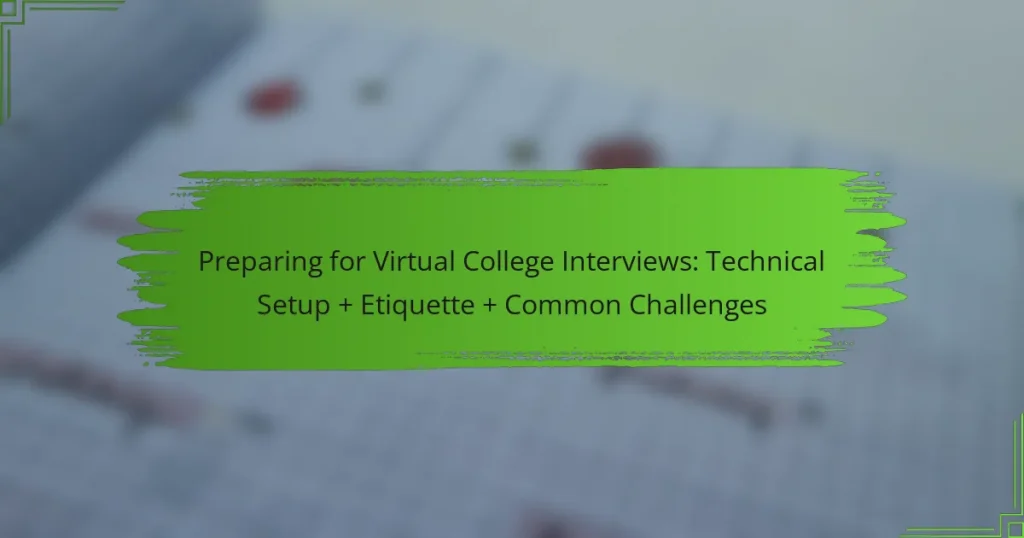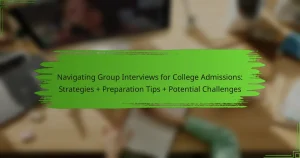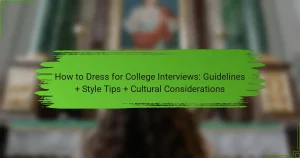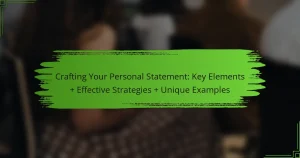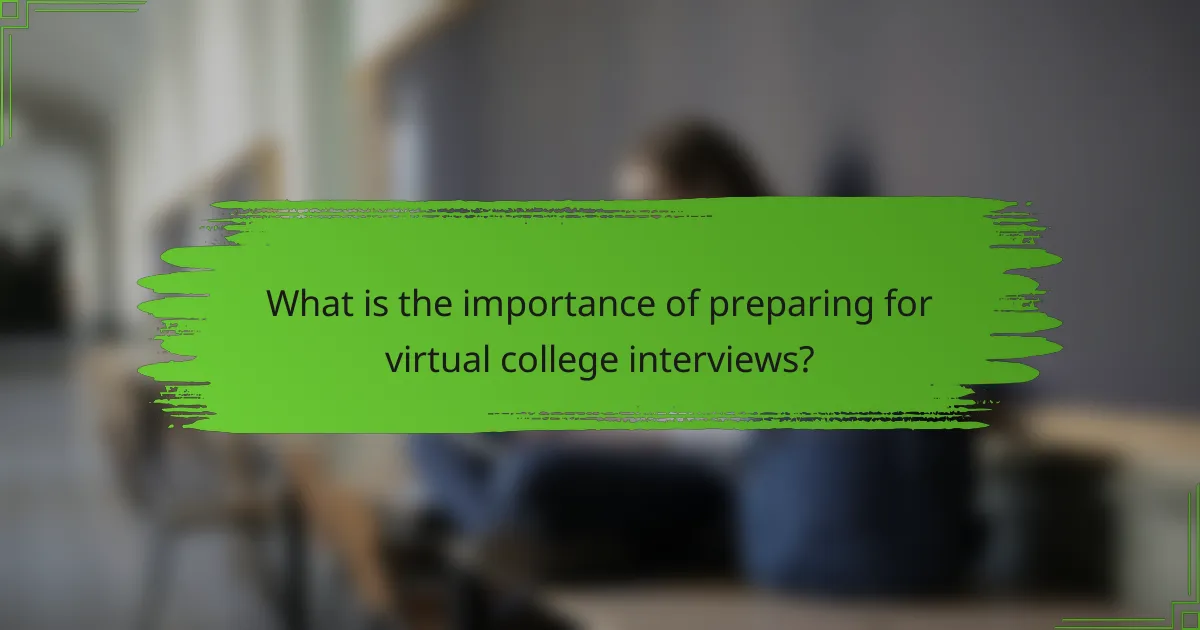
What is the importance of preparing for virtual college interviews?
Preparing for virtual college interviews is crucial for success. Proper preparation enhances confidence and reduces anxiety. Candidates who prepare can articulate their thoughts clearly. This clarity helps in making a positive impression. Research shows that first impressions are formed within seconds. A well-prepared candidate demonstrates professionalism and seriousness. Additionally, preparation allows candidates to anticipate common questions. This foresight enables them to provide thoughtful, relevant answers. Overall, preparation significantly increases the likelihood of a favorable outcome.
How do virtual college interviews differ from traditional interviews?
Virtual college interviews differ from traditional interviews primarily in their format and setup. Traditional interviews occur in person, allowing for direct face-to-face interaction. Virtual interviews take place online, using video conferencing tools. This shift impacts the technology required, as candidates must ensure a stable internet connection and functioning devices.
Body language and non-verbal cues can be less visible in virtual settings, affecting communication. Additionally, virtual interviews often require candidates to manage their environment, ensuring a quiet and professional backdrop. Traditional interviews may involve more spontaneous interactions, while virtual formats can allow for a more structured approach with prepared questions.
The scheduling process can also differ; virtual interviews may offer more flexibility in timing. Lastly, follow-up etiquette may vary, as virtual interviews often rely on email communication rather than in-person thank-yous.
What technological advancements have influenced virtual college interviews?
Technological advancements have significantly influenced virtual college interviews. The rise of high-speed internet has enabled seamless video conferencing. Platforms like Zoom and Microsoft Teams have become essential tools for interviews. Improved [censured] and microphone technology enhance audio-visual quality. Artificial intelligence tools assist in interview preparation and practice. Scheduling software streamlines the interview process for both candidates and institutions. Virtual reality is emerging as a tool for immersive interview experiences. These advancements collectively create a more efficient and effective interview environment.
Why is preparation crucial for success in virtual college interviews?
Preparation is crucial for success in virtual college interviews because it enhances confidence and performance. Being well-prepared allows candidates to articulate their thoughts clearly. It also helps in managing technology effectively, reducing the chances of technical issues during the interview. Research shows that candidates who practice responses perform better. A study by the National Association of Colleges and Employers found that preparation significantly impacts interview outcomes. Furthermore, preparation enables candidates to understand the institution better, aligning their responses with the college’s values. This alignment can make a candidate more appealing to interviewers. Overall, thorough preparation is linked to improved interview success rates.
What are the key components of a successful virtual college interview?
The key components of a successful virtual college interview include proper technical setup, effective communication, and professional presentation. Proper technical setup ensures a stable internet connection and functional audio-visual equipment. This minimizes disruptions during the interview. Effective communication involves clear articulation and active listening. It is important to engage with the interviewer and ask relevant questions. Professional presentation includes dressing appropriately and maintaining a tidy background. This creates a positive impression. Preparation also plays a crucial role. Researching the college and practicing common interview questions can boost confidence. These elements collectively contribute to a successful virtual college interview.
How does technical setup impact the interview experience?
Technical setup significantly impacts the interview experience by influencing communication clarity and participant engagement. A stable internet connection ensures that audio and video are transmitted without interruptions. Poor connectivity can lead to dropped calls or lag, causing frustration for both the interviewer and interviewee. Proper audio equipment enhances sound quality, allowing for clearer conversations. Background noise can distract from the discussion, making it harder to focus on responses. Additionally, appropriate lighting helps present a professional appearance, which can affect first impressions. A well-organized virtual environment reflects professionalism and preparedness. Research indicates that technical difficulties can lead to negative perceptions of candidates, highlighting the importance of a reliable setup for successful interviews.
What role does etiquette play during virtual college interviews?
Etiquette plays a crucial role during virtual college interviews. It establishes professionalism and respect between the candidate and the interviewer. Good etiquette includes punctuality, which shows reliability. Candidates should dress appropriately, as it reflects their seriousness about the opportunity. Maintaining eye contact through the camera is essential for engagement. Active listening demonstrates attentiveness and respect for the interviewer’s questions. Additionally, using polite language and thanking the interviewer conveys appreciation. Research indicates that candidates who exhibit strong etiquette are perceived more favorably by interviewers. A study by the National Association of Colleges and Employers found that soft skills, including etiquette, significantly impact hiring decisions.
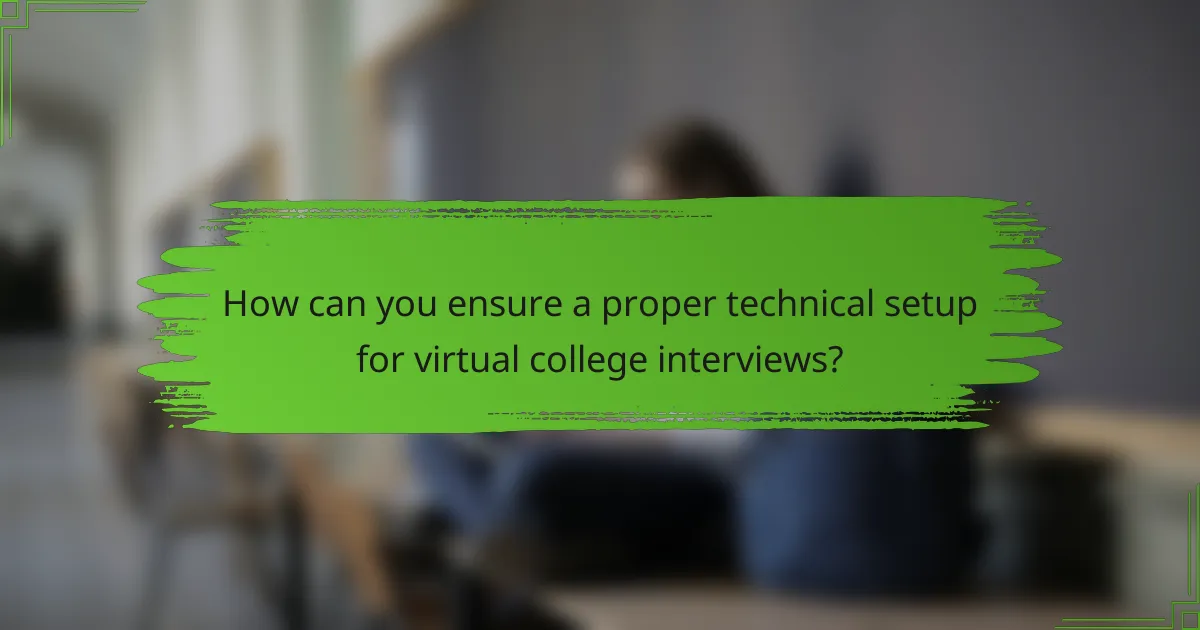
How can you ensure a proper technical setup for virtual college interviews?
To ensure a proper technical setup for virtual college interviews, verify your internet connection. A stable and high-speed connection is essential for clear communication. Test your audio and video equipment before the interview. Use a good quality microphone and [censured] for optimal sound and image clarity. Choose a quiet, well-lit space for the interview. Proper lighting enhances visibility, while a quiet environment minimizes distractions. Familiarize yourself with the video conferencing platform in advance. Knowing how to use features like mute and screen sharing is crucial. Conduct a trial run with a friend or family member. This practice helps identify any technical issues beforehand. Following these steps can significantly improve the interview experience.
What equipment is essential for a virtual college interview?
Essential equipment for a virtual college interview includes a reliable computer or laptop. A stable internet connection is crucial for seamless communication. A high-quality [censured] enhances video clarity. A good microphone ensures clear audio. Headphones can help reduce background noise. Proper lighting improves visibility during the interview. Finally, a quiet and distraction-free environment is necessary for focus. These elements collectively contribute to a professional virtual interview experience.
How do different devices affect the interview quality?
Different devices significantly affect interview quality through their audio and video capabilities. High-quality webcams provide clearer visuals, enhancing the interviewer’s ability to read [censured] expressions. Devices with superior microphones capture audio more accurately, reducing misunderstandings. For instance, laptops often have better integrated hardware than smartphones. This leads to clearer communication and a more professional appearance. Additionally, devices with stable internet connections minimize lag and interruptions. Research shows that 70% of interviewers consider video clarity crucial for assessing candidates. Thus, the choice of device directly influences the overall interview experience and outcomes.
What software platforms are commonly used for virtual interviews?
Zoom, Microsoft Teams, and Google Meet are commonly used software platforms for virtual interviews. Zoom is widely recognized for its user-friendly interface and reliability. Microsoft Teams integrates well with other Microsoft products, making it popular among organizations. Google Meet offers seamless integration with Google Workspace, facilitating easy scheduling and access. These platforms support video conferencing, screen sharing, and chat features, enhancing the interview experience. Their widespread adoption in both educational and professional settings underscores their effectiveness for virtual interactions.
How can you optimize your internet connection for a virtual interview?
To optimize your internet connection for a virtual interview, use a wired Ethernet connection instead of Wi-Fi. Wired connections provide more stability and faster speeds. Ensure your internet speed is at least 10 Mbps for smooth video streaming. Close unnecessary applications and devices that may consume bandwidth. Restart your router before the interview to refresh the connection. Position yourself close to the router to minimize signal interference. Test your connection using online speed tests to verify performance. According to the Federal Communications Commission, a stable connection is crucial for effective communication during video calls.
What steps can you take to troubleshoot internet issues before the interview?
Check your internet connection by running a speed test. A minimum of 3 Mbps for upload and download is recommended for video calls. Restart your router to refresh the connection. Ensure all cables are securely connected. Move closer to the router if using Wi-Fi to improve signal strength. Disconnect other devices that may be using bandwidth. Update your device’s network drivers for optimal performance. Test the video conferencing platform beforehand to identify any issues.
Why is a stable connection important for virtual interviews?
A stable connection is crucial for virtual interviews to ensure clear communication. Unstable connections can lead to lag, disconnection, or poor audio and video quality. These issues can disrupt the flow of conversation and hinder the interview process. According to a study by the Pew Research Center, 60% of participants reported that technical difficulties negatively impacted their online interactions. A reliable connection fosters a professional environment, allowing candidates to present themselves effectively. Additionally, it helps interviewers assess candidates without distractions. Overall, a stable connection enhances the overall experience for both parties involved.
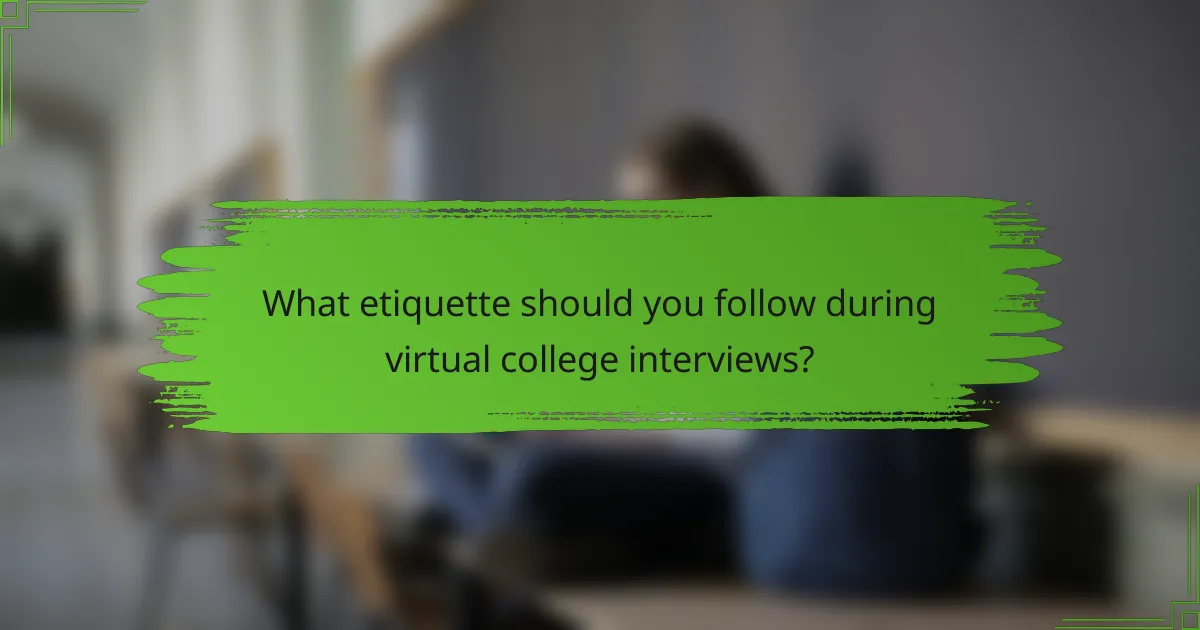
What etiquette should you follow during virtual college interviews?
During virtual college interviews, maintain professionalism in your appearance and behavior. Dress as you would for an in-person interview. This shows respect for the interviewers and the process. Ensure your technology works properly before the interview. Test your camera, microphone, and internet connection to avoid technical issues. Choose a quiet, well-lit space for the interview. This minimizes distractions and enhances your visibility. Make eye contact by looking at the camera, not the screen. This creates a connection with the interviewer. Listen actively and avoid interrupting the interviewer. This demonstrates respect and engagement. Finally, follow up with a thank-you email after the interview. This reinforces your interest in the college and appreciation for their time.
How should you dress for a virtual college interview?
Dress professionally for a virtual college interview. Aim for business casual or formal attire, such as a collared shirt and blazer. Avoid overly casual clothing like t-shirts or sweatpants. Ensure your clothing is neat and free from wrinkles. Choose solid colors or subtle patterns for a polished look. Pay attention to grooming, including hair and makeup. This creates a positive impression and shows respect for the interview process. Research indicates that first impressions are formed within seconds, making appropriate attire crucial.
What are the expectations for professional appearance in a virtual setting?
Professional appearance in a virtual setting requires individuals to dress appropriately and maintain a tidy background. Participants should wear business casual or formal attire, similar to what would be worn in an in-person interview. This includes collared shirts, blouses, or blazers. Grooming is also important; hair should be neat and [censured] hair trimmed. A clean and organized background enhances professionalism and minimizes distractions. Lighting should be adequate to ensure visibility. These expectations align with common standards in professional environments, reinforcing the importance of first impressions.
How can body language impact your virtual interview performance?
Body language can significantly impact your virtual interview performance. Non-verbal cues like posture, eye contact, and [censured] expressions convey confidence and engagement. Positive body language can enhance your credibility and make you more relatable to the interviewer. For example, maintaining eye contact can create a sense of connection, while slouching may suggest disinterest. Research indicates that 55% of communication is non-verbal, highlighting its importance. Effective body language can help you stand out in a competitive interview process.
What communication tips can enhance your virtual interview presence?
To enhance your virtual interview presence, focus on clear and confident communication. Maintain eye contact by looking at the camera, not the screen. Use a strong, audible voice to ensure clarity. Speak at a moderate pace to allow comprehension. Avoid filler words to maintain professionalism. Use appropriate body language, such as nodding and smiling, to convey engagement. Minimize distractions in your environment to maintain focus. Practice active listening by summarizing points made by the interviewer. These strategies improve overall communication effectiveness during virtual interviews.
How can you effectively engage with interviewers in a virtual format?
To effectively engage with interviewers in a virtual format, maintain eye contact and use active listening skills. Position your camera at eye level to create a natural interaction. Speak clearly and at a moderate pace to ensure your message is understood. Use appropriate body language, such as nodding, to show attentiveness. Ask relevant questions to demonstrate your interest in the conversation. Ensure your background is tidy and free from distractions to maintain professionalism. Test your technology beforehand to avoid technical issues during the interview. Research the interviewer and the institution to tailor your responses accordingly. These strategies enhance engagement and create a positive impression.
What common pitfalls should you avoid during virtual interviews?
Common pitfalls to avoid during virtual interviews include technical issues, poor lighting, and distractions. Technical issues can disrupt the flow of the interview. Ensure your internet connection is stable and test your equipment beforehand. Poor lighting can make it hard for interviewers to see you clearly. Position yourself in a well-lit area, ideally facing a window. Distractions can divert attention from the interview. Choose a quiet space and inform others not to interrupt. Additionally, lack of preparation can lead to inadequate responses. Research the institution and practice common interview questions. Finally, neglecting to dress appropriately can create a negative impression. Dress professionally, as you would for an in-person interview.
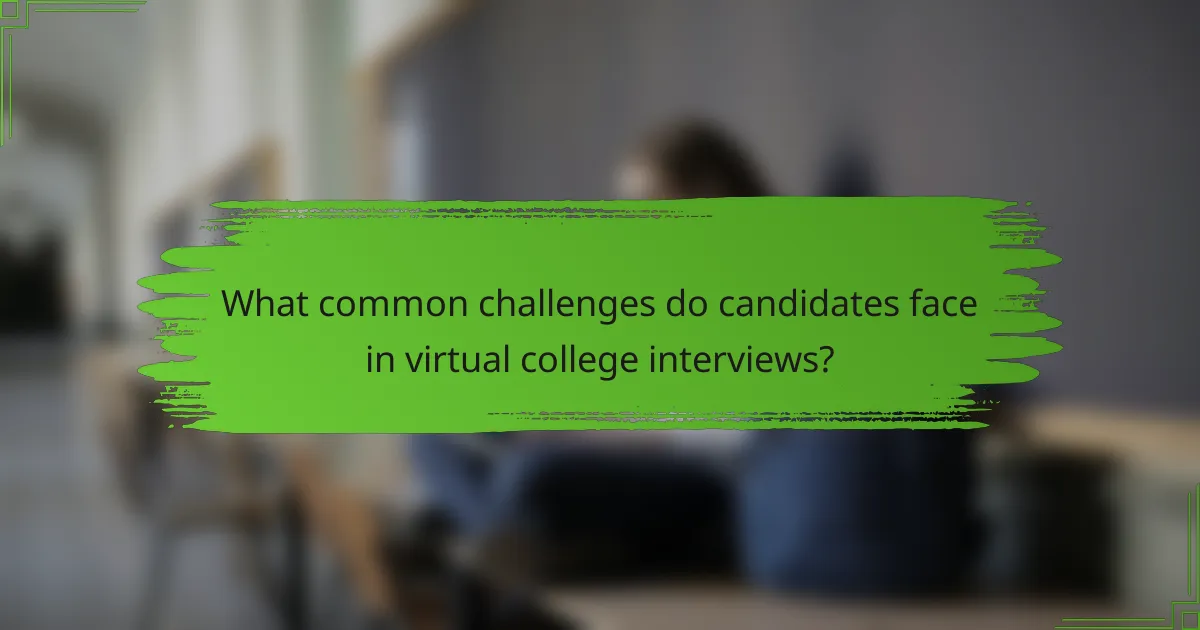
What common challenges do candidates face in virtual college interviews?
Candidates face several common challenges in virtual college interviews. Technical difficulties are a major issue. Poor internet connectivity can disrupt the interview. Audio or video malfunctions may hinder communication. Another challenge is creating a professional environment. Candidates may struggle with background distractions. It can be difficult to maintain eye contact through a screen. Additionally, candidates often feel increased anxiety in virtual settings. This can affect their performance and confidence. Lastly, candidates may lack familiarity with virtual interview platforms. This can lead to confusion during the interview process.
How can technical issues disrupt a virtual interview?
Technical issues can significantly disrupt a virtual interview. Common disruptions include poor internet connectivity, which can lead to audio and video lag. This lag can make communication difficult and cause misunderstandings. Additionally, software malfunctions may prevent participants from joining the meeting or accessing necessary features. Hardware problems, such as malfunctioning microphones or cameras, can hinder the interviewer’s ability to assess the candidate effectively. A study by the Pew Research Center found that 53% of adults have experienced technical issues during video calls. These disruptions can create a negative impression and detract from the interview’s overall effectiveness.
What are some strategies to handle unexpected technical difficulties?
Prepare a backup plan to address unexpected technical difficulties during virtual college interviews. This includes having a secondary device ready, such as a smartphone or tablet, to join the interview if the primary device fails. Ensure a stable internet connection by using a wired connection when possible or having a mobile hotspot as a backup. Test all equipment, including cameras and microphones, before the interview to identify any potential issues. Familiarize yourself with the video conferencing software to quickly navigate settings if problems arise. Maintain open communication with the interviewer, informing them promptly of any technical issues. Lastly, practice troubleshooting common problems, such as reconnecting to the call or adjusting audio settings. These strategies enhance preparedness and minimize disruptions during interviews.
How can you maintain composure during technical disruptions?
To maintain composure during technical disruptions, focus on staying calm and collected. Take deep breaths to reduce anxiety and regain focus. Acknowledge the issue without panicking. Inform the interviewer about the disruption promptly. Have a backup plan, such as an alternative device or platform. Practice troubleshooting common issues beforehand to build confidence. Studies show that preparation can reduce stress in high-pressure situations. For instance, a survey by the American Psychological Association found that preparedness significantly enhances performance during stressful events.
What psychological challenges might candidates encounter during virtual interviews?
Candidates may encounter several psychological challenges during virtual interviews. One significant challenge is anxiety, which can stem from the unfamiliarity of the virtual format. A study by the American Psychological Association found that 47% of job seekers experience anxiety during interviews. Distractions at home can also affect concentration, leading to decreased performance. Another challenge is the lack of non-verbal cues, which can create misunderstandings and increase stress. Candidates may also feel isolated due to the virtual setting, impacting their confidence. Furthermore, technical issues can exacerbate feelings of frustration and helplessness. These factors collectively contribute to a more challenging interview experience for candidates.
How does anxiety manifest in virtual interview settings?
Anxiety in virtual interview settings often manifests as nervousness, difficulty concentrating, and physical symptoms like sweating or shaking. Candidates may experience heightened self-consciousness due to being on camera. They might struggle with technical issues, which can exacerbate feelings of inadequacy. Additionally, the lack of in-person interaction can lead to misinterpretations of cues. Research indicates that 70% of individuals feel more anxious in virtual settings compared to in-person interviews. This anxiety can negatively impact performance and communication.
What techniques can help alleviate interview-related stress?
Techniques to alleviate interview-related stress include preparation, visualization, and breathing exercises. Preparation involves researching the institution and practicing common interview questions. This boosts confidence and reduces anxiety. Visualization entails imagining a successful interview scenario, which can enhance performance. Breathing exercises, such as deep breathing, help calm the nervous system. Engaging in physical activity prior to the interview can also reduce stress levels. Studies show that physical activity releases endorphins, which improve mood. Additionally, maintaining a positive mindset can shift focus away from stress. These techniques collectively contribute to a more relaxed interview experience.
What are some best practices for succeeding in virtual college interviews?
To succeed in virtual college interviews, candidates should ensure a professional environment. This includes a clean, quiet space with good lighting. Test all technology beforehand, including camera and microphone. Familiarize yourself with the interview platform to avoid technical issues. Dress appropriately as you would for an in-person interview. Maintain eye contact by looking at the camera, not the screen. Prepare answers to common questions and have questions ready for the interviewer. Follow up with a thank-you email to express appreciation for the opportunity. These practices enhance professionalism and help create a positive impression.
How can you prepare effective responses to common interview questions?
To prepare effective responses to common interview questions, practice is essential. Start by researching typical interview questions for your field. Familiarize yourself with questions such as “Tell me about yourself” and “What are your strengths?” Structure your answers using the STAR method: Situation, Task, Action, Result. This method helps you provide clear and concise responses. Record yourself answering questions to evaluate your delivery and body language. Seek feedback from peers or mentors to refine your responses. Additionally, tailor your answers to reflect your experiences and skills relevant to the role. This approach ensures your responses are both personal and engaging.
What follow-up actions should you take after a virtual interview?
Send a thank-you email to the interviewer within 24 hours. Express gratitude for the opportunity and mention specific discussion points. This shows professionalism and reinforces your interest in the position. Additionally, connect with the interviewer on LinkedIn if appropriate. This helps maintain a professional relationship. Follow up again if you haven’t heard back after the specified timeline. This indicates your continued interest and keeps you on their radar. Keep your follow-up concise and polite. Research indicates that timely follow-ups can improve your chances of a positive outcome.
The main entity of the article is “Virtual College Interviews.” This article emphasizes the importance of preparation for virtual college interviews, highlighting the significance of technical setup, effective communication, and professional etiquette. Key components discussed include managing technology, creating a distraction-free environment, and understanding common challenges candidates face, such as anxiety and technical issues. The article also outlines best practices for successful interviews, including appropriate dress, body language, and follow-up actions, ensuring candidates are well-equipped to make a positive impression.
